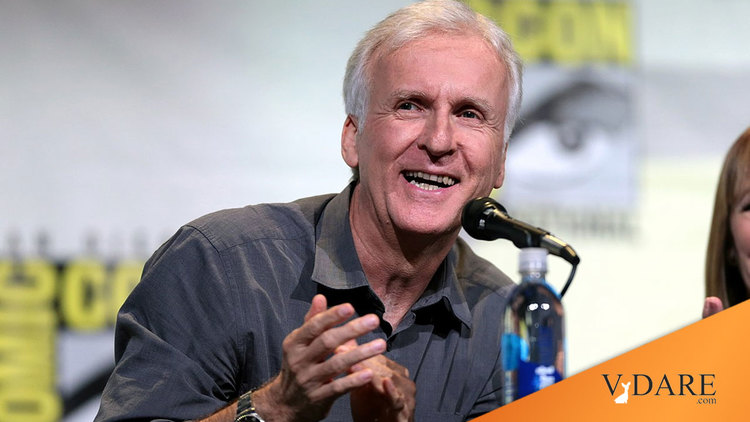


By Steve Sailer
12/15/2022
From my Taki’s Magazine review of Avatar in January 2010:
Like many guys of a certain age, I’ve nurtured a love-hate attitude toward James Cameron that goes back a quarter of a century to a point about five minutes into Terminator. That’s when it started to dawn upon me that the man behind this cheesy, low-budget time travel flick starring that muscle man who talks funny was the most ambitious and accomplished hard science-fiction filmmaker ever.
Yet, if Cameron had so much talent that he could make the movie of my dreams, then it is easy for me to assume that he should make it. And when he doesn’t, I tend to take it personally.
Nevertheless, Cameron deserves some vindication. For example, rather than being the America-hating leftist of neocon fulminations, Cameron is a worthy successor to the greatest American science fiction writer, Robert A. Heinlein (1907-1988).
A highly imaginative writer, Heinlein’s politics were far from consistent. (His three cult novels have three wildly different cults: Starship Troopers was the second book on the official U.S. Marine Corps reading list, while Stranger in a Strange Land was beloved by hippies, and The Moon Is a Harsh Mistress by U. of Chicago libertarians.) Still, it’s fair to say that Heinlein was not a conventional Hollywood liberal.
Having been raised on Heinlein novels, I could always see where Cameron was coming from. His second film, 1986’s Aliens, struck me as Heinlein’s Starship Troopers done better than Heinlein himself could manage. Cameron left out the political chatter and added extra helpings of suspense and combat between giant space bugs and humans in powered armor suits.
Indeed, in a recent interview with blogger Jordan Hoffman, Cameron credits Heinlein’s 1959 novel as the inspiration for Aliens. He goes on to denounce Paul Verhoeven’s smirky 1997 adaptation of Starship Troopers. When asked to recommend sci-fi novels, Cameron responded:
JC: I’d say anything by Heinlein … Starship Troopers , if you want to see where Aliens was inspired. Which, of course, was made into a not great film…
JH: Not great?! I’m throwing the gauntlet down. It’s great in a tongue and cheek sort of way.
JC: Yeah, I think that’s what I didn’t care for, because the original story by Heinlein is pretty serious. The last line of the book, and he means it absolutely seriously, is: “to the everlasting glory of the infantry.” He was celebrating the ground-pounder, the dogface, but in a futuristic context.
Cameron is pro-soldier and anti-war, a combination the neocons find shocking but I find appealing.
Heinlein’s thumbprints can be found all over Avatar‘s pastiche of a plot. For instance, the device that launches Cameron’s scenario one identical twin must substitute at the last minute for his brother on an interstellar voyage is also in Heinlein’s 1956 novel Time for the Stars. Moreover, Avatar appears to borrow one of its central ideas — Pandora, a planet where the entire ecosystem is a single living network exchanging information — from the climax of Heinlein’s 1953 book for boys, Starman Jones.
Indeed, Avatar’s main plot — a human soldier teams up with a seemingly primitive but actually wise alien tribe to prevent an evil Earthling mining company from despoiling their sacred tropical homeland — can be found in Heinlein’s 1948 “young adult” story Space Cadet.
This is not to say Cameron is plagiarizing Heinlein. Rather, Heinlein’s ideas are part of the creative DNA of every artist working in hard sci-fi.
Further, Cameron is confronted with the same storytelling problem as Heinlein: they both love giant machines, but audiences don’t want to see the overdog win. Heinlein used a more convoluted variant of the Avatar plot in both Red Planet (1949) and Between Planets (1951). In these, the heroes are human settlers on Mars or Venus who enlist the admirable indigenous aliens in their fight for planetary independence from the oligarchic rulers of Earth.
In Heinlein’s books, it’s as if the American Revolution saw the American settlers allying with the American Indians to defeat King George. (The reality, of course, was closer to the opposite. As the Declaration of Independence’s reference to “merciless Indian Savages“ suggests, “democracy” and “indigenous rights” are more antonyms than synonyms.) Not surprisingly, Cameron, who was born and raised through age 16 in Canada, can’t be bothered with Heinlein’s contortions, so Avatar is politically simpler than its sources in the Heinlein canon.